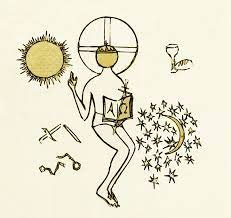Matthew 16.13-20
At the beginning of his ministry, Jesus leads the crowds who have gathered around him up the gentle slope overlooking the Sea of Galilee. Looking over the unimpressive, motley group of people assembled around him (sort of like you all), Jesus says— despite all evidence to the contrary— “You are the light of the world.”
Just before he imputes to them an unlikely enlightenment, Jesus bestows beatitude:
“Blessed are the poor in spirit, they’ve already got the keys to the Kingdom. Those who weep and mourn— they’re blessed too, for they will be comforted. And the powerful are in for a surprise because it’s the weak who are blessed— they’re the ones who will inherit the earth. Speaking of the powerful, those who wage peace will be blessed because they’re going to be my siblings. They will be called children of God.”
Altogether in his Sermon on the Mount Jesus reveals nine beatitudes.
As Jesus starts to set his face toward Jerusalem where the Word will be nailed to wood, Jesus adds another beatitude. And this new beatitude names not those who suffer persecution or those who show mercy or starve for justice.
This new beatitude singles out and celebrates those who rightly name Jesus:
“Blessed are those who say that Jesus is the Christ, the Son of the Living God.”
A fifth generation doctor, Chris Kerr works at Hospice & Palliative Care Buffalo.
A recent New York Times article reports on Kerr’s decades-long work to document a phenomenon he first noted as a child; namely, Kerr chronicles the deathbed visions received by the dying and how those experiences help the dying let go of living.
Kerr recalls how he first observed a deathbed vision as a twelve year old boy in 1974. While the memory has faded, the sense of mystery he felt at his dying father’s bedside is still sharp. A surgeon, Kerr’s father seldom had time to spend with his son save for a yearly fishing trip in the Canadian wilderness.
Dying from cancer, Chris Kerr recalls how his father reached out for the buttons on his son’s shirt and, fiddling with them, muttered something about how they needed to catch the plane to their cabin in the woods. “I knew intuitively,” Kerr remarks to the reporter, “I knew wherever he was, must be a good place because we were going fishing.”
Kerr recounts how, in that moment, he moved to touch his father but suddenly felt a hand on his shoulder.
A priest had followed the boy into the dying father’s hospice room and now the priest was leading the child away, explaining to the boy that his father was delusional.
Kerr’s father died hours later.
Now a doctor himself, Kerr does not believe his father was delusional at all. He instead insists that he witnessed an end-of-life vision; that is, his father’s mind was taking him to a time and place where he and his son could be together, in the wilds of northern Canada. And the priest, he feels, made a mistake, one that many other caregivers make, of dismissing the moment as a break with reality.
After Kerr graduated from medical school he transitioned to PhD work in neurobiology. In order to earn extra money to support his wife and two daughters, Kerr took a part-time job with Hospice Buffalo. “Until then,” the article observes, “Kerr had worked in the conventional medical system, focused on patients who were often tethered to machines or heavily medicated. If they recounted visions, he had no time to listen.”
Now, however, in the slow stillness of hospice, Chris Kerr discovered that his father’s deathbed experience was not at all unique. Patient after patient, Kerr witnessed the dying speak of people and places perceptible only to the dying. “So just like with my father,” he explains, “there’s this feeling of reverence, of something that wasn’t understood but certainly felt.”
In 2010 Kerr agreed to conduct a scientific study of such deathbed visions. His research partner, Anne Banas, agreed to Kerr’s proposal when she recalled how her dying grandfather had imagined himself in a train station with his brothers. Kerr and Banas published their research in 2014 in The Journal of Palliative Medicine, documenting that an astonishing eighty-eight percent of dying patients experience at least one vision.
According to Kerr, the accounts highlight the paradox of dying:
“That while there is physical deterioration, [the dying] are growing and finding meaning. And this is in fact what patients tell us themselves, that they are being put back together. What’s striking about the patients’s visions is not so much the content but rather the patients’s demeanor. It’s a constant. There’s always an absence of fear.”
Despite his extensive research, which he has since corroborated with international studies, Kerr says science nevertheless cannot answer why the dying so often leave life without fear.
His research, he admits, cannot explain why the dying feel not that they are falling apart but rather that they are being put back together.
And yet—
The church has always had a straightforward answer to that very mystery.
Indeed, the church is founded upon the answer.
The answer is Peter’s answer, “You are the Messiah, the Son of the Living God.”
This passage is the single most researched and remarked upon pericope in the entirety of Matthew’s Gospel. In no small part, the scholarly interest in this text is due to the explicit and unabashedly exclusive claims Jesus makes for himself in his exchange with Peter.
Not until he has set his face to Jerusalem does Jesus disclose his true identity.
And he does not ask his disciples what they think about him until they come to Caesarea Philippi.
A gift from the Roman emperor Caesar Augustus to Herod the Great, Caesarea Philippi literally means, “The Caesar City of Phillip.” Phillip was Herod’s son.
The city’s name speaks to its fidelity to the dead gods.
At the center of the city stood three temples.
Phillip erected one temple to the Canaanite god, Baal.
Another temple he dedicated to the pagan deity, Pan.
Finally, Phillip built a temple to honor his benefactor, the Roman godhead head of Caesar.
Baal, Pan, and Caesar.
Jesus does not ask his disciples about his identity until they arrive in Caesarea Philippi where the icons of the world’s rival religions are arrayed behind him.
The timing and location of his question signal Jesus has "deliberately set himself against the background of the world's religions in all their history and splendor, and demanded to be compared with them.” The Greek suggests a negative connotation to his question, “Who does the world say the Son of Man is?” The same world Jesus will say he has overcome on his way to the cross.
Who does the world say that I am?
And of the four possibilities that the disciples posit, all four are prophets. “Some say John the Baptist,” they reply, “but others Elijah, and still others Jeremiah or one of the prophets.”
Indeed for much of the Christ-less Christianity in the contemporary world, prophet is Jesus’s only office.
Across much of the moribund church, Mary’s boy and Pilate’s victim is simply a prophet who faced down empire and stood up for love and justice. Interestingly, as much as the world today similarly treats Jesus as merely a teacher and moral exemplar, none of the disciples report any confusion about Jesus being a new Moses.
According to the disciples, none say that Jesus is a lawgiver and teacher.
According to the disciples, all say that Jesus is a prophet and truth-teller.
According to Jesus, he is neither.
That Jesus is neither a prophet nor a teacher is implicit in the way he frames his first question.
Take note.
Jesus does not ask the disciples, “Who do the people say that I am?”
No, with the backdrop of the world’s religions behind him, Jesus asks, “Who do the people say that the Son of Man is?”
And then the verse which immediately follows makes it explicit that Jesus understands himself as the Son of Man.
In the Hebrew Bible, the Son of Man is the occupant of the Last Future who will come on the Father’s authority to judge the world. Already, out of the gate, the question itself stipulates a higher view of the identity of Jesus than is held by the world, “Who do the people say that the Judge who comes from God’s Future is?”
That Jesus is neither prophet nor lawgiver is but a reminder that it is possible to have good thoughts about Jesus and yet not the right thoughts about Jesus.
It is possible to have a high opinion about Jesus but not nearly high enough.
It is possible to have strong faith in Jesus while putting that faith in the wrong Jesus.
It is possible to apply his example to your own life while not trusting what he said about his own life and identity.
“Who do the people say that the Judge who comes from God’s Future is?”
While Jesus appears only curious what the world says about him, he betrays a perceptible urgency for his followers to identify him, "But you, who do you say that I am?”
Peter does not hedge. He does not preface his response with “I think…” Peter does not prevaricate. He does not shy from the exclusivity of the claim, with “For us, you are…”His answer is as decisive as it is all-inclusive, “You are the Christ, the Son of the Living God.”
As New Testament scholar Frederick Dale Bruner writes:
The Christian church is well when she is as decisive and emphatic as Peter; she is sick— near her deathbed— when she equivocates who Jesus is or, worse, agrees with the world about him.
You are the Son of the Living God.
The correlative clause is necessary, for the messiah is not simply a king but God’s final king, the ruler not of Israel but the Kingdom of God. And because the King and the Kingdom are one and the same, the Christ is the Kingdom. Just so, the Christ is both other than God and also God.
Which is to say—
He is the future with a capital F.
This is what Peter claims when he confesses, “You are the Son of the Living God.”
Jesus is the identity of the Future.
In the New York Times piece, the palliative care researcher, Chris Kerr, recalls a patient named Connor O’Neil, who died at the age of ten in 2022.
Kerr reports that just two days before his death, Connor called out the name of a family friend who, with the boy’s knowledge, had just died.
The boy had seldom spoken in several days, but then Connor called out the name of their dead friend and then began to converse with him.
“Do you know where you are?” Connor’s mother asked her dying son.
“Jesus,” the boy replied.
And in that moment, the boy sat up under his own strength and threw his arms around his mother’s neck and said, “Mommy, I love you.”
Kerr admits that his research method could not even begin to do justice to the mystery he had witnessed countless times.
“We were so caught up in trying to quantify and give structure to something so deeply spiritual,” Kerr says, "and really, we were just bystanders, witnesses to this…It feels a little small to be filling in forms when you’re looking at a ninety year old veteran who is back in time seventy years being put back together in a way you can’t even understand.”
Kerr chalks it up to “the inadequacy of language” to capture the mystery of how the dying die.
But this is a conclusion the scriptures will not permit believers to draw.
In fact, language is more than adequate to capture the mystery because the Living God is a loquacious Lord who creates by no other means than speaking it so.
Moreover, the language for the particular mystery under Kerr’s microscope can be streamlined to a single word.
Jesus.
Jesus is our Future.
Which means—
The Future is fully identifiable with Jesus, the Friend of Sinners.
Of course, the dying leave life with an absence of fear! The dying leave life without fear because the Future is Jesus, the Good Shepherd, who gave up his own life for them. And of course the dying die counterintuitively feeling as though they’re being put back together because, quite simply, they are being put back together. As the apostle Paul writes, the Father raised Jesus from the dead for just this purpose— “for our rectification.”
Absolutely language is adequate to capture the mystery!
Connor captured it in a single word— a name, “Jesus.”
And Jesus says to Peter—
“What Connor said is the rock on which I will found my church.”
Jesus.
This is not as simple as it sounds.
The Protestant Reformer Martin Luther argues that you can easily distinguish true churches from false ones. The latter, Luther writes, always want to proclaim something other than Jesus Christ the Son of the Living God. “There is no church,” Luther says, “except the church founded on this confession.”
Speaking only for myself, it would be much easier if Jesus built his church on something other than this particular rock, “You are the Christ, the Son of the Living God.”
Such a specific stone leads to an uncomfortably inclusive church.
It would be much more straightforward if Jesus built his church on the Bible, say. Or correct biblical interpretation. Or even biblical principles: love of neighbor, compassion for the poor, welcome of the outcast. Building blocks like those make sense to us. It would be easier if Jesus founded his church on cultural issues or social causes or political ideologies. For that matter, it would be simpler if Jesus left it up to us to build our church. If we were in charge, then we could build the church in our image.
Roman Catholic dogma aside, it’s not the person Peter on whom Jesus builds the church.
It’s the pointing Peter.
The church’s one foundation is that to whom Peter points in his confession, “You, the Son of Man, are the Christ, the Son of the Living God.”
As Frederick Dale Bruner writes:
“This Christ-pointing is called Christocentricity, and it is the gift of this activity, above all else, that builds churches. Disciples and communities who modestly, tirelessly, and faithfully point to Jesus as It are disciples and communities that Jesus honors by using to build up his church. Christ-centeredness is the key to church building…The exclusive church builder is the living Christ himself. According to the exact picture used in this verse, it is not Peter or other Christocentrics like him who build Christ's church; rather, it is Jesus himself who uses Christocentric disciples and their pointing and who turns all such pointing persons into mortar.
Christ-pointing Peter has the honor of being the first stone Jesus picked for the building of his church. The church does not belong to Peter, his successors, or to any other church leaders. She belongs to Jesus Christ, exclusively and entirely. The picture drawn in this first formal discussion of the church in the Gospels is that of a living Lord, able to build his own community. The church's mission consists simply and loyally in pointing to Jesus as the Christ.”
This week I attended a gathering in Indianapolis hosted by the Lily Foundation for their Compelling Preaching Endowment.
In the hotel bar Wednesday night, I reconnected with a friend, a lay leader from the Florida Annual Conference of the United Methodist Church.
Derrick is about my age.
Derrick is African-American.
Derrick is gay.
Eventually, our conversation turned to our denomination’s looming General Conference in which I quickly deferred to my middling centrist talking points.
Not far into our dialogue, Derrick slammed his margarita down on the table and said, “I came out of the closet two years ago. As soon as I did, so many of the churches with whom I was friends, churches where I had been trusted to speak and teach and lead, they walked away from me.”
And take note of his language.
Notice who is doing the departing.
“They walked away from me. I came out of the closet, but I didn’t leave the house! I have never wavered from the church’s one foundation. Jason, do you have any idea how hard it is to stay in the United Methodist Church as a black, gay man?”
And I said, “Uh….”
Derrick continued, “I’m still here because I know Jesus is Lord and because he has my heart. My faith is no different than it was before I came out of the closet. Actually, my faith is stronger because now it’s more truthful. All those churches who walked away from me— they did so according to a criteria for the church different than the one Jesus gave.”
I made a joke about ordering another round.
Derrick doubled down, “I came out of the closet but I never left the house. I am in your house, Jason. I am under your roof. Aren’t you going to defend me?”
“I’d love to defend you,” I said, “But that might offend some of the other house guests.”
He smiled, catching my sarcasm.
“Well, you can tell them,” he said, “their problem with me is not a problem with me. It’s a problem with Jesus. He’s the one who builds the church and picks out someone like me to be a part of it. If you don’t want someone like me around, then you better go find yourself a dead god. If you want to get the United Methodist Church off of life support, you’ve got to get over Jesus choosing people like me to build his church.”
During his research, Chris Kerr was checking on a seventy year old woman named Mary, whose grown children had gathered in her room.
Without warning, Kerr says, Mary sat up in her bed, crossed her arms at her chest, and cooed the name, “Danny.”
She then she kissed and cuddled a baby only she could see.
At first, her children were confused.
There was no Danny in the family.
By now no stranger to such experiences, Kerr investigated and discovered that long before her four children were born, Mary had lost a baby in childbirth.
She never revealed it to her children until the end.
Thinking of patients like Mary, Kerr delivered a TED Talk in 2015. Pacing the stage, he told the audience— note the active agent in his sentence:
“When I was present at the bedside of the dying, I was confronted by what I had seen and tried so hard to forget from my childhood. I saw dying patients reaching and calling out to mothers, and to fathers, and to children, many of whom hadn’t been seen for many years. What was remarkable was so many of them looked at peace…My point here is, I didn’t choose this topic of dying. I feel it has chosen me…
Once again the scientist’s language is inadequate to account for the mystery.
But that is not because language is inadequate!
It’s right here in our scripture passage.
Death did not choose Chris Kerr for his task.
The one who lives with death behind him chose him for his task.
And he has chosen you too.
Not to bear witness to death but to bear to witness that Jesus is the Christ, the Son of the Living God.
And to the extent you can trust this call—
The good news is that Jesus says you’re on par with the poor and the pure in heart.
You are blessed.
The Kingdom is yours already.
And to the extent you don’t trust it—
Come to the table.
In your hands and in your bellies, just as he does for Peter, God has promised to gift you faith.




















Share this post